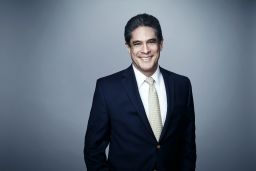CNN Opinion asked political contributors to weigh in on the results of the New Hampshire primary. The views expressed in these commentaries are their own.
Raul A. Reyes: Nikki Haley’s identity crisis
This isn’t?the?Olympics. This is the GOP contest?for the presidential nomination — and there are no medals for second place.?Although former South Carolina Gov. Nikki Haley is the last contender standing between former President Donald Trump and the Republican nomination, the results in New Hampshire do not bode well for her future.

Haley cast?herself as a?reasonable?alternative to?Trump, a traditional Republican who could attract “Never Trump” GOP voters and Independents. The problem with this approach is that most Republican?voters do not want an?alternative to Trump;?they?overwhelmingly back him. Polling?shows?Trump?even leads?Haley in her home state of South Carolina.
Haley’s campaign?suffers from an?identity crisis.?She presents herself as a?moderate,?and yet on issues like immigration,?she echoes?Trump’s hardline positions, including?mass deportations?of undocumented migrants?and?finishing the border wall.
She?declared that?“America has never been a racist country,” despite recounting?discrimination that she?experienced growing up. While?she called for?a?“national consensus” on abortion,?her vague stance?on reproductive rights?confused?voters.
She questioned whether Trump was?mentally fit for?office?and criticized?him?for?“too many lies.”?Yet she also suggested that, if elected,?she would pardon?him.?And despite Trump’s bigoted attacks on her heritage (like calling her by a mangled version of her birth name), Haley?told CNN’s Dana Bash?that she would vote for him?if he became the Republican nominee.
How does any of this add up to a coherent message?
Over the last few months, Haley has?alternated?between being a?principled conservative?and a Trump sycophant. In the process, she lost herself and any viable?shot at the White House. On a broader?level, Haley’s failure?to launch in the Granite State?is more evidence that the GOP is becoming?less of a political party and more of a cult?of personality.
Raul A. Reyes is an attorney and a member of the USA Today board of contributors. Follow him on Twitter?@RaulAReyes.
SE Cupp: Haley should keep fighting for all the Americans who don’t want Trump
This primary isn’t over. At least that’s what the Nikki Haley campaign said after finishing second to former President Donald Trump in the New Hampshire primaries on Tuesday.

While conventional wisdom, political analysts, talking heads and the Trump campaign insist this race is over, and that former Trump is the inevitable Republican nominee, it bears pointing out that nearly half of New Hampshire voters chose someone other than Trump. In Iowa last week, 49% of?voters in Iowa chose someone other than Trump.
The only accurate way of describing the state of this race is that the voters in the Republican primary are divided, and have not, in fact, coalesced around Trump as he’d have us believe. That’s not a great way to go into a general election, with so many voters explicitly saying, as they did to CNN field reporters, that they were over Trump. That might change over the course of the primary, but if New Hampshire offers us a snapshot in time, the picture is of a fairly weak frontrunner. As the Haley campaign told me earlier on Tuesday, it’s almost as if a bunch of Republicans have left the party because of Trump … and Nikki is bringing them home.
Can the former South Carolina governor bring them all the way home? The map gets harder for her from here. But?Haley has a $4 million ad buy?starting Wednesday in South Carolina, and the campaign is looking ahead to Michigan, which votes a few days after her home state, as another place she can give Trump a run for his money.
For independents, moderates and disaffected Republicans, Haley represents an all-too-important candidate in this race: the woman standing between Trump and the White House. For everyone – including the Biden campaign – declaring this race over, she owes it to those voters to stay in and not succumb to Trump’s inevitability posturing, or Biden’s eagerness to face a weaker candidate. She’s earning votes to stop Trump, and that’s what she must continue to do.
SE Cupp is a CNN political commentator.
Paul Begala: The disaster looming for Trump
There are two very different storylines that emerged from New?Hampshire:?The first is former President Donald Trump’s cult-like support among diehard Republicans.?The more important story, though, is his stunning weakness among independents.

Trump lost a stunning?two-thirds?of New Hampshire voters who are not in either political?party, according to initial results from a CNN exit poll.?In?Iowa,?43%?of?former South Carolina Gov. Nikki Haley’s supporters said they would vote for President Joe Biden against?Trump.
That the Republican Party is now one more Trump property is news from nowhere.?In the eight years since he slithered down that escalator in Manhattan’s Trump Tower, he has remade the party.?Where Reagan-Bush?Republicans stood for limited government, strong national defense, and traditional family values, Trump added about $8 trillion to?the?national debt, disdains?NATO, and has been found by a jury of his peers to be civilly liable for?sexual abuse?(which he has denied).
Trump’s challenge, now that the nomination fight is effectively over, will be to appeal to voters who are turned off by his cult of personality. His angry, bitter speech Tuesday night was a terrible beginning for the general election.?Did the grievance-filled rant?against Haley?sound like a winner to you? No, it sounded like a guy who is in deep?doo-doo with independents.
This is a potential disaster for Trump. To attend this year’s Iowa GOP caucuses in the freezing cold, you had to be a very committed Republican. (Unlike New Hampshire, Iowa does not allow independents to vote in the GOP caucus.) And yet nearly half of the loyal Republicans who supported Haley?in Iowa?say they cannot support Trump in November;?Biden?wins them by a margin of 20 points.
Trump’s team should have a well-deserved drink. But the hangover is going to be brutal.
Paul Begala, a Democratic strategist and CNN political commentator, was a political consultant for Bill Clinton’s presidential campaign in 1992 and served as a counselor to Clinton in the White House.
Ana Marie Cox: A war of whose base is more terrified
No matter how you feel about former President Donald Trump’s decisive victory in New Hampshire, there is bad news: Our country is now in general election mode, and it will be for 285 more days. Almost a full year. Even if the names at the top of the ticket change (which is still within the realm of possibility), the die is cast for the rest of the contest.

I am uncertain as to how the country survives the sensory assault of a prolonged presidential campaign — the ads; the endorsements; the controversies, real and imagined — and lives to vote about it. Remember how the monotony of the pandemic — hearing the same thing on the news every day, the same background sense of enormity — warped our sense of time? This could be like that, but louder.
What American will still feel like voting after nine months of being asked to? Nagging someone just encourages tuning out. We have lost the patience to watch television on a week-to-week basis; to keep us engaged, someone (the campaigns or the media covering them) will have to come up with cliffhangers far beyond the traditional questions of vice-presidential choices and debate performances.
If so, what could those stakes be? I fear the campaigns could become an ever-escalating war of even more extreme statements, on both sides, though I cannot imagine how we go more apocalyptic than we already are. President Joe Biden has said to voters, “Your freedom is on the ballot.” Trump … well, Trump finds the apocalypse in everything from the presence of immigrants to windmills. He warns constantly that the country itself may come to an end.
But Trump’s ego cannot abide any subsiding of attention; his word salad will get spicier every time he senses the nation’s eyes wandering. Then Biden will have to alert his voters to Trump’s extremism, his warning amping up the emotional charge even more.
Potentially, it becomes a contest as to whose base is more terrified of the other.
Trump — and Trumpism, or whoever represents it — is dangerous. Raise alarms! But the relentlessness of what’s to come troubles me. I have trouble picturing a high voter turnout if our experience of democracy is a series of campaign ads stomping on a human face, forever.
Ana Marie Cox is a political journalist and writer in Austin.
Jamal Simmons: Biden’s write-in victory shows he’s passing the test
Getting a primary challenger is usually the harbinger of doom for a president. Often, that challenge has roots in an ideological critique. Not so for Minnesota Rep. Dean Phillips. His challenge to President Joe Biden is rooted in chronology, not policy.

President Jimmy Carter faced a challenge from the left by?Senator Edward Kennedy in 1980. Kennedy was a liberal icon. Carter won the nomination but?suffered a devastating loss in the general election?against Republican Ronald Reagan that year.
President George H.W. Bush was challenged by conservative columnist and ideological pitchfork holder?Pat Buchanan?in 1992. Democratic nominee Bill Clinton and third-party candidate Ross Perot exploited that division in the Republican Party against Bush in the fall.?Bush lost?that campaign.
Biden’s main intraparty challenger, however, isn’t attacking him for being out of touch with the party or the country. His main line of attack is that the?president is too old.
That’s not insignificant.?Voters care. It comes up in just about every survey. But agism isn’t an alternative vision for the future. It’s process. If most Democrats agree that Biden’s strengths are more important than his advanced years, the president should be okay.?Time will tell.
More worrying would be an anti-war candidate running on Biden’s embrace of Israel in the war against Hamas after its?brutal October 7 attack on Israel. There’s real ideological sand out there that could help a challenger get traction. Young people and many people of color?reject Biden’s Israel policy. It was?Eugene McCarthy’s anti-Vietnam campaign?that undid President Lyndon Johnson in 1968.
Marianne Williamson?is running that campaign?in the Democratic primary but with no success. In an alternate universe, more prominent progressives such as US Sen. Bernie Sanders or Washington Rep. Pramila Jayapal might. Not this year.
Instead, Democrats are wrestling with whether?an 81-year-old Biden is up to the job. Tuesday night in New Hampshire we had the first answer to that question, and it appears Biden is passing the test.
Jamal Simmons is a longtime Democratic political and communications advisor. He was most recently communications director for Vice President Kamala Harris at the White House and is currently a CNN political commentator.
Daniel McCarthy: Haley faces more humiliating losses if she stays in the race
Former South Carolina Gov. Nikki Haley had everything going for her in the New Hampshire primary. This is a state that often rewards moderates and mavericks: where John McCain beat former President George W. Bush by?18 points?in 2000. With President Joe Biden not even appearing on the New Hampshire Democratic ballot this time, liberal-leaning independents who wanted to participate in an exciting race had an easy excuse for voting in the Republican primary. They could show their disapproval for former President Donald Trump by voting for Haley.

It wasn’t enough. Trump has?comfortably?won New Hampshire, and the Republican race that looked like it was already over after the Iowa caucuses is unquestionably finished now. The next big contest is in her home state,?South Carolina, but she polls worse there than she has in the?Granite State. South Carolina looks like a safe state for Trump — the only question is what his margin of victory will be.
Haley knows this, and so does her campaign staff. So do her donors. Will they stay in the fight for another month, just to lose to Trump by a bigger margin than Tuesday night? As Florida Gov. Ron DeSantis showed in the days between his second-place finish in Iowa and his withdrawal from the race, it’s agony to keep campaigning when you know you only face humiliation in the races to come.
The Republican Party is united behind Trump, and with optimal conditions for an opponent like Haley, Trump was still unstoppable. Now he’s weighing vice presidential picks, and the ultimate contest — the rematch between him and Biden — begins.
Daniel McCarthy is the editor of “Modern Age: A Conservative Review” and a columnist for?“The Spectator World”?and Creators Syndicate.
Rizwan Virk: Marianne Williamson could have been what Democrats needed
The results Tuesday night, while not awarding any delegates to the current president, only confirmed what many of us liberal Democrats suspected: The Democratic Party no longer gives a fighting chance to candidates other than establishment neoliberals, so we must look elsewhere.

That President Joe Biden will be the winner of the nomination seems a foregone conclusion, even though I think author Marianne Williamson, who represents more traditional liberal values, could have made a bigger impact if she was given a chance.
Williamson might have picked up the pro-peace contingent if she hadn’t been mostly ignored by the traditional media and other Democrats. She was one of the few peace candidates, calling for a ceasefire early on in Gaza, and even wrote that rather than bombing the Houthis in Yemen, we might resolve the Red Sea shipping crisis by stopping the bombing of Gaza, the stated reason for the Houthis’ attacks on merchant vessels – a principled liberal stance that no other mainstream candidate seems willing to say out loud. Biden’s stance on both Gaza and Ukraine seem to align more with neoliberal and neocon values.
After liberal stalwart Bernie Sanders, the Vermont senator, criticized Biden for failing to address working-class voters’ concerns, Williamson pointed out that there was a Democrat who was already doing so (herself), but was largely ignored by Sanders and the media.
Even failed 2020 candidate Andrew Yang, who suffered a similar fate to Williamson in the Democratic primaries, encouraged Williamson to step aside in favor of Minnesota Rep. Dean Philips just a few days before the New Hampshire primary. Williamson’s response to Yang should make traditional liberals beam: “The days of a woman stepping aside on the assumption that a man can do a better job are over.”
Rizwan Virk?founded Play Labs @ MIT and is the author of “The Simulation Hypothesis: An MIT Computer Scientist Shows Why AI, Quantum Physics and Eastern Mystics Agree We Are in a Video Game.” He is currently at Arizona State University’s College of Global Futures.
Patrick T. Brown: Trump cleared the GOP ranks of future leaders in his march to the top
It’s all over but the shouting – former South Carolina Gov. Nikki Haley may have barely mustered a close enough showing in the New Hampshire primary Tuesday to justify a push toward her home state, but for all intents and purposes, the Republican Party has chosen to nominate former President Donald Trump for a third time.

The roster of those whom Trump defeated on his way to victory in?2016,?2020?and 2024 shows the deep bench of possible presidential contenders that Republicans had prided themselves on?during the presidency of Barack Obama.
Dozens took their shot and lost: Successful governors who turned out to be paper tigers, like former Wisconsin Gov.?Scott Walker?and Florida Gov.?Ron DeSantis; self-described compassionate conservatives like former Florida Gov.?Jeb Bush?and South Carolina Sen.?Tim Scott; principled conservative senators like Texas Sen.?Ted Cruz?and Florida Sen.?Marco Rubio; business-friendly moderates like former Ohio Gov.?John Kasich?and, of course, Haley. All of them, plus many more, proved more out of touch with the base of the party than the twice-divorced former reality TV star from New York.
There’s little doubt, now, that Trump has remade the party in his own image. In so doing, he?cleared out an entire bench of those who would have offered a different path to the White House. Even if the likes of Cruz or DeSantis were to run again, they would do so as a Trump product, not a tea party one.
The next time there’s a meaningful Republican primary election, it will be a question of which of the post-Trump figures can best channel his energy — not which of his contemporaries can best present an alternative.
Patrick T. Brown is a fellow at the Ethics and Public Policy Center, a conservative think tank and advocacy group based in Washington, DC. He is also a former senior policy adviser to Congress’ Joint Economic Committee.
Sophia A. Nelson: Most of the fellas in the race backed Trump. That was a mistake with women
After the results of the Iowa caucuses, too many?considered the trailblazing former South Carolina Gov. Nikki Haley dead in the political water. It turns out she wasn’t.?Finishing third in Iowa to former President Donald Trump and Florida’s Gov. Ron DeSantis, many thought Haley seemed a long shot to be competitive in a two-person race with Trump at the New Hampshire primary on Tuesday night after DeSantis dropped out of the presidential primary this past weekend. And yet, she held her own on Tuesday.

But the real news coming out of New Hampshire is the ugly gender war in the GOP. Nearly all the fellas came to Trump’s rescue, including South Carolina Sen. Tim Scott, who owes his political?rise to Haley after she appointed him to the US Senate in 2012. At a time when the women of America feel under assault when it comes to reproductive rights and the Biden-Harris team centered an event Tuesday night in Virginia around reproductive rights, the Republicans seem badly out of touch with the women of America.
Case in point: once-rising Republican star Haley. At age 51, she was the only woman to go toe-to-toe with the guys on the debate stage, and by some accounts, she won every single time.?And yet, the men of the Trump Party just do not get it from where this former moderate Republican woman of color sits.
They do not understand how vulnerable they are with women voters, and I expect 2024 will showcase that. As for Haley, I hope she stays in the race and finally finds the courage to call Trump out for the threat to American democracy that he is. Regardless, she should not under any circumstance be his running mate; she needs to run again in 2028, when the GOP and America will finally be free of Trump.
Sophia A. Nelson?is a former House GOP Congressional Investigative Committee Counsel and author of?“ePluribus One: Reclaiming our Founders’ Vision for a United Americ
Arick Wierson: ‘Minnesota nice’ gets an icy reception in the Granite State
Overshadowed by the contentious GOP primary between former President Donald Trump and former UN Ambassador and South Carolina Gov. Nikki Haley, Tuesday’s New Hampshire Democratic primary was unique in its own right.

The outcome for Democrats was only symbolic since none of the votes translated to delegates for the presidential nomination after New Hampshire rejected the Democratic National Committee’s decision to take away its first-primary-in-the-nation status.
That made Tuesday’s vote more of a referendum on the strength of President Joe Biden. Indeed, the DNC’s decision to disregard the New Hampshire primary forced the state’s Democratic establishment to organize an 11th-hour write-in campaign for Biden – since he wasn’t on the ballot given the DNC’s move – to avoid a possible embarrassment by upstart challenger Dean Phillips, a third-term congressman from Minnesota, whom I have known since he launched his promising political career back in 2018.
Phillips’ hoped that the incumbent president’s absence from New Hampshire would provide an opening for testing his thesis that rank-and-file Democrats are keen on having an alternative to Biden and that the Democratic establishment is “sleepwalking towards disaster”?with the 81-year-old president as its nominee, but that hypothesis met a somewhat icy reception in New Hampshire.
Sure, Biden might fail to hit the same 80%+ threshold that Presidents?Barack Obama?and?Bill Clinton?achieved in the New Hampshire primary as they ran for second terms in 2012 and 1996, respectively. But the fact that Biden’s results were strong despite being a write-in candidate who spent basically zero time campaigning in the state speaks volumes about the power he still commands among the party faithful.
Phillips, for his part, is undeterred, telling me Tuesday night that he vows to fight on. “We’re taking our message to South Carolina and then Michigan and then maybe all the way to the finish line. We’re just getting started,” he told me. “Democrats deserve options, and it’s not clear at all that President Biden can beat Donald Trump. And once Americans become more familiar with the daylight that exists between me and the president on a host of issues from Israel to the southern border to Medicare for all – I am confident our campaign will only grow in support.”
Kudos to Phillips for sticking to his guns, but the road ahead won’t be getting any easier. With Biden on the ballot in future states and his campaign machine operating at full speed, Phillips’ reception in the next few primaries will likely be even more frigid than in New Hampshire.
Arick Wierson is an Emmy Award-winning television producer and former senior media adviser to former New York Mayor Michael Bloomberg.
Dante?Scala: The big ‘what ifs’ that didn’t happen

Sometimes the biggest story of a New Hampshire primary is the thing that didn’t happen.
Heading into the evening, there were already rumblings that?Donald Trump?would not just win New Hampshire, but win by a landslide.
Meanwhile, on the Democratic side, it was unclear how Joe Biden would fare as a write-in candidate –?and in a state which he just?demoted?from its prized first-in-the-nation status.
In short, it seemed reasonable to wonder:?What would the political consequences be for the Democratic incumbent if he failed to get a larger percentage of the Democratic vote than Trump did in the GOP primary?
But none of that happened.
Trump earned a solid victory,?with?about 55% of the vote.?But while he retained his blue-collar base, he trailed Haley among?White voters with a college degree?by an 18% margin.
In New Hampshire and other swing states, he may well face continued skepticism among suburban voters.
Meanwhile, it appears that more than 60% of Democratic voters supported Biden, even though voters had to write-in his name.
Gone are the?comparisons to Lyndon Johnson and 1968.?Dean Phillips is no Gene McCarthy.
2024 will go down in New Hampshire primary history as rather forgettable.?But only if you forget what didn’t happen.
Dante?Scala is a professor of political science at the University of New Hampshire, currently watching his seventh presidential primary.
Margaret Talev: Trump’s zeal to fight is resonating with voters

Intensity. Identification. Anger. The results from New Hampshire show persistent strengths for former President?Donald Trump with Republican voters that President Joe Biden can’t ignore as both look past the remaining primaries toward a general-election rematch.
Almost three in four?of?Trump’s backers in exit polls expressed?“strong”?support for him;?Biden can’t match that right now in his own party.
It seems that?Trump’s zeal to?fight and his supporters’ perceptions that he shares their values are more important to them than temperament or electability — especially?those without college degrees?and with negative perceptions of the economy and mistrust of the 2020 election results.
Dissatisfaction with the economy and direction of the country seem top of mind for voters this year. But on top of that, Trump’s backers appear to be disproportionately dissatisfied, another factor that may keep them engaged.
New Hampshire’s results do carry some real warnings for Trump in terms of the general election. Nikki Haley’s closer-than-expected New Hampshire loss shows many independents and a significant minority of Republicans don’t want Trump back in the White House.
They include moderates who want to preserve women’s access to abortion and institutionalists who dislike Trump’s past conduct, legal troubles, hardline immigration or foreign policy approaches.
Haley’s backers said they were driven more by their quest for a Trump alternative than devotion to her.?But Trump’s back-to-back hold on his party in two very different states, Iowa and now New Hampshire, shows how formidable he may still be.
Margaret Talev?is the Kramer Director of Syracuse University’s Institute for Democracy, Journalism & Citizenship in Washington, DC, and an Axios senior contributor.
